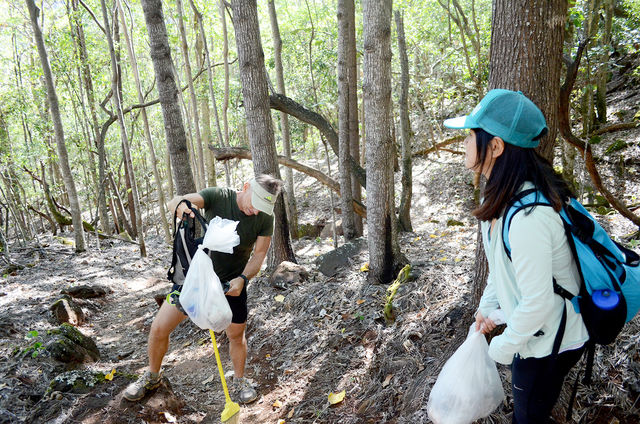KUKUI TRAIL — For more than a year, a disheveled yellow broom has been lying next to a covered picnic table on the Waimea Canyon floor. But on Tuesday, the broom got a lift to the top of the canyon
KUKUI TRAIL — For more than a year, a disheveled yellow broom has been lying next to a covered picnic table on the Waimea Canyon floor.
But on Tuesday, the broom got a lift to the top of the canyon along with three bags filled with things like plastic bottles, a metal fork and a heavy-duty metal cooking pot, as well as other trash.
“Today, there isn’t as much as usual,” said Natsuko Nishikawa, who has been heading small trash-collecting expeditions to the bottom of the Kukui Trail since the beginning of July. “We had it cleaned up a while ago and then people left more trash.”
According to Emma Yuen of the state’s Division of Forestry and Wildlife, the entity that manages the Wiliwili Camp site, littering in the forest reserve can carry a fine of up to $2,500 for the first violation with the potential of higher fines for further offenses.
Nishikawa was joined by her friend Steven Peck on Tuesday’s hike. The pair descend 2,000 feet to the canyon floor once or twice a week to collect trash, then carry it the grueling 2.5 mile climb back to the top.
“I usually start at 5:30 or 5 (a.m.) and then Steve catches up later. He likes to run down the trail and try to beat his time every time,” Nishikawa said. “If we don’t start too early, it gets hot.”
Peck’s best time down the trail is just a hair over 27 minutes, from the trailhead to the picnic table.
The two have made enough trash-gathering outings together that Nishikawa now mandates Peck wear a bicycle helmet when he runs down the mountain for safety.
“That’s probably a good idea,” Peck said. “But it’s more than just the exercise and the challenge, it’s about helping out the land.”
For two weeks in late July, Nishikawa, Peck and a few friends hit the trail hard, and climbed the canyon every other day laden with bags of trash.
“There were batteries — hundreds of them, maybe for those tracking collars on dogs or radios — and used pots and pans,” Nishikawa said. “There was even a sleeping bag that was soaked.”
Peck went down the trail on his own on two occasions after they saw the sleeping bag — one trip to hang it in the branches of some trees to dry, and a second trip to cart it out.
“We think maybe there was someone camping down here and it rained, so they just left everything and went home,” Peck said.
The mess is disappointing to Nishikawa, because the hike back up is a very difficult climb.
“Hiking out with trash and climbing up the hill is not easy for anyone, yet some of us have made several trips to the bottom of the canyon,” Nishikawa said. “In less than two weeks from the cleanup, the site was filled with more trash yet again.”
The Department of State Parks has little to no staff regularly monitoring campgrounds, according to Alan Carpenter, assistant administrator for the state Department of Land and Natural Resources.
Permit conditions require campers to clean up the campsite, he explained, but potential penalties aren’t a real deterrent and litter laws are difficult to enforce.
“It is a matter of responsible camping. There is a general lack of wilderness ethic — “Take only pictures, leave no footprints” — with campers in Hawaii,” Carpenter said, adding that another problem is “people stash gear in the belief they will return to use it in the future.”
The daunting climb back up can also lead people to ditch everything but the necessities on the canyon floor, “assuming someone else will clean it up,” Carpenter said.
The campground site is under DOFAW jurisdiction, and Kukui Trail is within the realm of State Parks. Both entities clean up the messes that have been left behind by people. Both entities also balance resources and staff size with the constant need to clean up after campers and hikers.
The Na Pali Coast is one of the most extreme examples, Carpenter said.
For Nishikawa, Peck and their little gang of trash collectors, the trek is getting difficult, and Nishikawa said she’s hoping people will start cleaning up after themselves when they’re outdoors on Kauai.
“It’s a slow process and a lot of times it starts with the kids, changing the mindset,” Nishikawa said.
In the meantime, folks who ride horses and ATVs along the canyon floor could help out the effort, Nishikawa said.
“And anyone in Waimea, on the Westside, we could use help keeping that place clean,” Nishikawa said.


